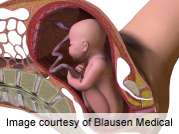(HealthDay)—The current evidence is inadequate for assessing the benefits and harms of depression treatment in pregnancy and the postpartum period, according to a review published online July 7 in Obstetrics & Gynecology.
Marian S. McDonagh, Pharm.D., from the Oregon Health and Science University in Portland, and colleagues examined the benefits and harms of antidepressant treatment in pregnant and postpartum women. Data were reviewed from six randomized controlled trials and 15 observational studies.
The researchers found that the risk of respiratory distress was higher for neonates of pregnant women with depression taking selective serotonin reuptake inhibitors versus neonates of untreated women (13.9 versus 7.8 percent; P < 0.001), but no difference was seen in neonatal convulsion risk (0.14 versus 0.11 percent; P = 0.64) or preterm birth (17 versus 10 percent; P = 0.7). In studies of pregnant women receiving antidepressants for mixed or unreported reasons versus pregnant women not taking antidepressants (depression status unknown), indirect evidence suggested future studies should focus on congenital anomalies and autism spectrum and attention deficit disorders in offspring. Insufficient evidence was available for other outcomes.
"Evidence about the comparative benefits and harms of pharmacologic treatment of depression in pregnant and postpartum women was largely inadequate to allow informed decisions about treatment," the authors write. "Considering the prevalence of depression, filling this gap is essential."
More information:
Abstract
Full Text (subscription or payment may be required)
Journal information: Obstetrics & Gynecology
Copyright © 2014 HealthDay. All rights reserved.




















